Nancy Wilson, the Grammy-winning "song stylist" and torch singer whose polished pop-jazz vocals made her a platinum artist and top concert performer, has died.
Wilson, who retired from touring in 2011, died after a long illness at her after a long illness at her home in Pioneertown, a California desert community near Joshua Tree National Park, her manager and publicist Devra Hall Levy told The Associated Press late Thursday night. She was 81.
Influenced by Dinah Washington, Nat "King" Cole and other stars, Wilson covered everything from jazz standards to "Little Green Apples" and in the 1960s alone released eight albums that reached the top 20 on Billboard's pop charts. Sometimes elegant and understated, or quick and conversational and a little naughty, she was best known for such songs as her breakthrough "Guess Who I Saw Today" and the 1964 hit "(You Don't Know) How Glad I Am," which drew upon Broadway, pop and jazz.
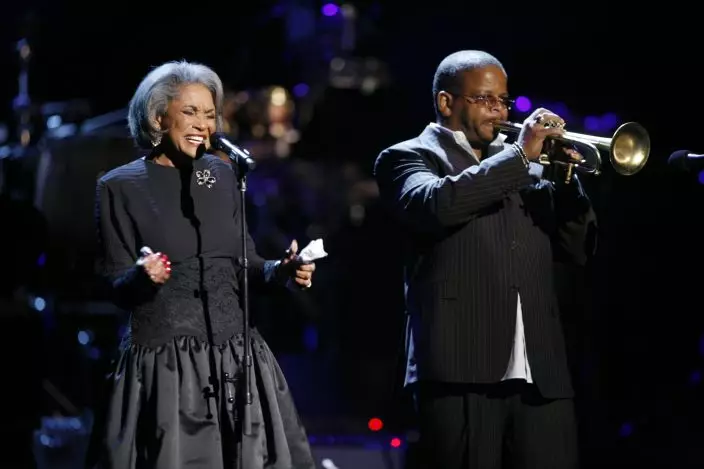
FILE - In this Oct. 28, 2007 file photo, Nancy Wilson, left, and Terence Blanchard, right, perform during an all-star tribute concert for Herbie Hancock, in Los Angeles. Grammy-winning jazz and pop singer Wilson has died at age 81. Her manager Devra Hall Levy tells The Associated Press late Thursday night, Dec. 13, 2018, that Wilson died peacefully after a long illness at her home in Pioneertown, a California desert community near Joshua Tree National Park. (AP PhotoRene Macura, File)
She resisted being identified with a single category, especially jazz, and referred to herself as a "song stylist."
"The music that I sing today was the pop music of the 1960s," she told The San Francisco Chronicle in 2010. "I just never considered myself a jazz singer. I do not do runs and — you know. I take a lyric and make it mine. I consider myself an interpreter of the lyric."
Wilson's dozens of albums included a celebrated collaboration with Cannonball Adderley, "Nancy Wilson/Cannonball Adderley," a small group setting which understandably could be called jazz; "Broadway — My Way"; "Lush Life"; and "The Nancy Wilson Show!" a best-selling concert recording. "How Glad I Am" brought her a Grammy in 1965 for best R&B performance, and she later won Grammys for best jazz vocal album in 2005 for the intimate "R.S.V.P (Rare Songs, Very Personal)" and in 2007 for "Turned to Blue," a showcase for the relaxed, confident swing she mastered later in life. The National Endowment for the Arts awarded her a "Jazz Masters Fellowship" in 2004 for lifetime achievement.

FILE - In this Feb. 13, 2005 file photo, Nancy Wilson poses with her award for best jazz vocal album for "R.S.V.P. (Rare Songs, Very Personal)" at the 47th Annual Grammy Awards in Los Angeles. Grammy-winning jazz and pop singer Wilson has died at age 81. Her manager Devra Hall Levy tells The Associated Press late Thursday night, Dec. 13, 2018, that Wilson died peacefully after a long illness at her home in Pioneertown, a California desert community near Joshua Tree National Park. (AP PhotoReed Saxon, File)
Wilson also had a busy career on television, film and radio, her credits including "Hawaii Five-O," ''Police Story," the Robert Townshend spoof "Meteor Man" and years hosting NPR's "Jazz Profiles" series. Active in the civil rights movement, including the Selma march of 1965, she received an NAACP Image Award in 1998.
Wilson was married twice — to drummer Kenny Dennis, whom she divorced in 1970; and to Wiley Burton, who died in 2008. She had three children.
Born in Chillcote, Ohio, the eldest of six children of an iron foundry worker and a maid, Wilson sang in church as a girl and by age 4 had decided on her profession. She was in high school when she won a talent contest sponsored by a local TV station and was given her own program. After briefly attending Central State College, she toured Ohio with the Rusty Bryant's Carolyn Club Big Band and met such jazz artists as Adderley, who encouraged her to move to New York.
She soon had a regular gig at The Blue Morocco, and got in touch with Adderley's manager, John Levy.
"He set up a session to record a demo," Wilson later observed during an interview for the Los Angeles Philharmonic. "Ray Bryant and I went in and recorded 'Guess Who I Saw Today,' 'Sometimes I'm Happy,' and two other songs. We sent them to Capitol and within five days the phone rang. Within six weeks I had all the things I wanted."
Her first album, "Like in Love!", came out in 1959, and she had her greatest commercial success over the following decade despite contending at times with the latest sounds. Gamely, she covered Beatles songs ("And I Love Her" became "And I Love Him"), Stevie Wonder's "Uptight (Everything's Alright)" and "Son of a Preacher Man," on which she strained to mimic Aretha Franklin's fiery gospel style. She was so outside the contemporary music scene an interviewer once stumped her by asking about Cream, the million-selling rock trio featuring Eric Clapton.
"It took me years to know what that question was about. Remember, I was constantly working or I was traveling to perform. The '60s for me were about work," she told JazzWax in 2010.
In the 1970s and after, she continued to record regularly and perform worldwide, at home in nightclubs, concert halls and open-air settings, singing at jazz festivals from Newport to Tokyo. She officially stopped touring with a show at Ohio University in September 2011, but had been thinking of stepping back for years. When she turned 70, in 2007, she was guest of honor at a Carnegie Hall gala. The show ended with Wilson performing such favorites as "Never, Never Will I Marry," ''I Can't Make You Love Me" and the Gershwin classic "How Long Has This Been Going On?"
"After 55 years of doing what I do professionally, I have a right to ask how long? I'm trying to retire, people," she said with a laugh before leaving the stage to a standing ovation.
In accordance with Wilson's wishes, there will be no funeral service, a family statement said. A celebration of her life will be held most likely in February, the month of her birth.
She is survived by her son, Kacy Dennis; daughters Samantha Burton and Cheryl Burton; sisters Karen Davis and Brenda Vann and five grandchildren.
VENICE, Italy (AP) — Under the gaze of the world’s media, the fragile lagoon city of Venice launches a pilot program Thursday to charge day-trippers a 5-euro (around $5.35) entry fee that authorities hope will discourage visitors from arriving on peak days and make the city more livable for its dwindling residents.
Signs advising arriving visitors of the new requirement for a test phase of 29 days through July have been erected outside the main train station and other points of arrival.
Some 200 stewards have been trained to politely walk anyone unaware of the fee through the process of downloading a QR code. A kiosk has been set up for those not equipped with a smartphone. Once past designated entry ports, officials will carry out random checks for QR codes that show the day-tripper tax has been paid or that the bearer is exempt.
Transgressors face fines 50 euros to 300 euros. The requirement applies only for people arriving between 8:30 a.m. and 4 p.m. Outside of those hours, access is free.
“We need to find a new balance between the tourists and residents,’’ said the city’s top tourism official, Simone Venturini. “We need to safeguard the spaces of the residents, of course, and we need to discourage the arrival of day-trippers on some particular days.”
Venice has long suffered under the pressure of over-tourism, but officials say that pre-pandemic estimates ranging from 25 million to 30 million visitors a year — including day-trippers — are not reliable and that the pilot project also aims to come up with more exact figures to help better manage the phenomenon.
By contrast, registered visitors spending the night last year numbered 4.6 million, according to city figures, down 16% from pre-pandemic highs.
Venturini said the city is strained when the number of day-trippers reaches 30,000 to 40,000. Its narrow alleyways are clogged with people and water taxis packed, making it difficult for residents to go about their business.
Not all residents, however, are persuaded of the efficacy of the new system in dissuading mass tourism, and say more attention needs to be paid to boosting the resident population and services they need.
Venice last year passed a telling milestone when the number of tourist beds exceeded for the first time the number of official residents, which is now below 50,000 in the historic center with its picturesque canals.
“Putting a ticket to enter a city will not decrease not even by one single unit the number of visitors that are coming,’’ said Tommaso Cacciari, an activist who organized a protest Thursday against the measure.
“You pay a ticket to take the metro, to go to a museum, an amusement park; you don’t pay a ticket to enter a city. This is the last symbolic step of a project of an idea of this municipal administration to kick residents out of Venice,” he said.
Venturini said about 6,000 people had already paid to download the QR code, and officials expect paid day-tripper arrivals Thursday to reach some 10,000.
More than 70,000 others have downloaded a QR code denoting an exemption, including to work in Venice or as a resident of the Veneto region. People staying in hotels in Venice, including in mainland districts like Marghera or Mestre, should also get a QR code attesting to their stay, which includes a hotel tax.
The tourist official says interest in Venice's pilot program has been keen from other places suffering from mass tourism, including other Italian art cities and cities abroad such as Barcelona and Amsterdam.
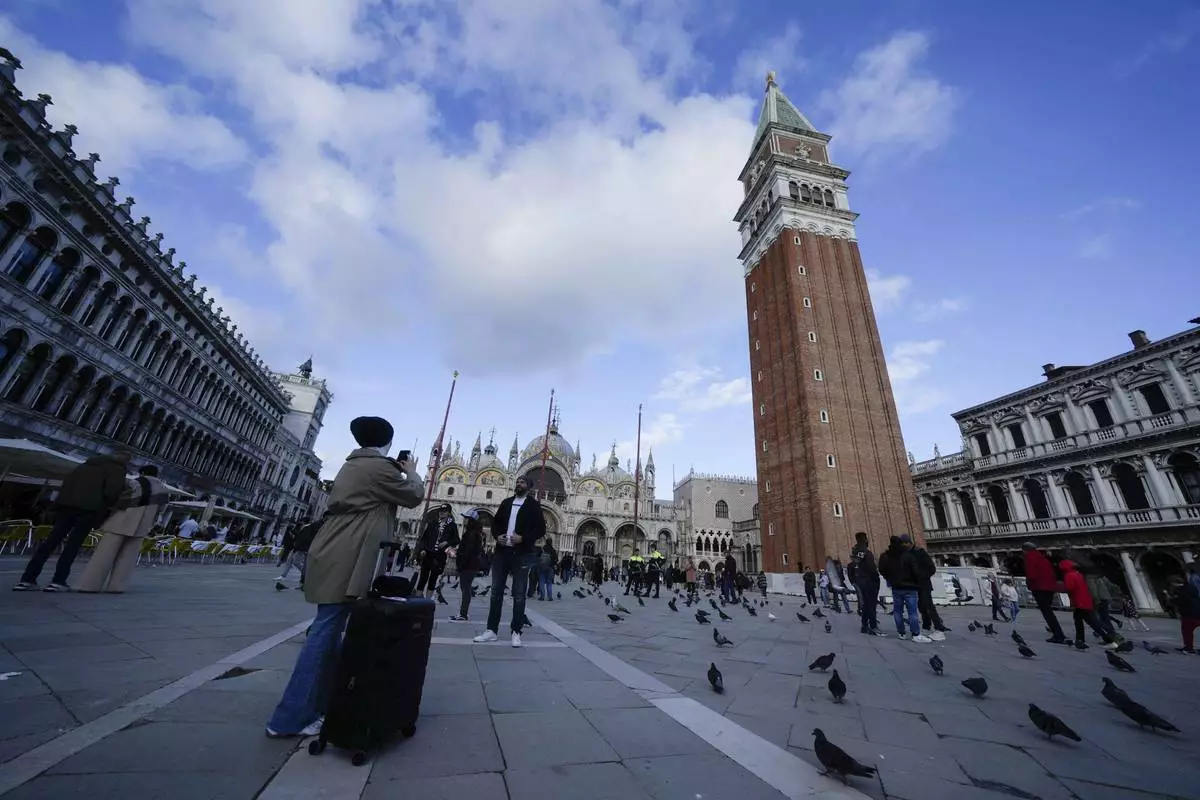
Tourists take pictures at the St. Mark square in Venice, Italy, Wednesday, April 24, 2024. The lagoon city of Venice begins a pilot program Thursday, April 25, 2024 to charge daytrippers a 5 euro entry fee that authorities hope will discourage tourists from arriving on peak days. Officials expect some 10,000 people will pay the fee to access the city on the first day, downloading a QR code to prove their payment. (AP Photo/Luca Bruno)
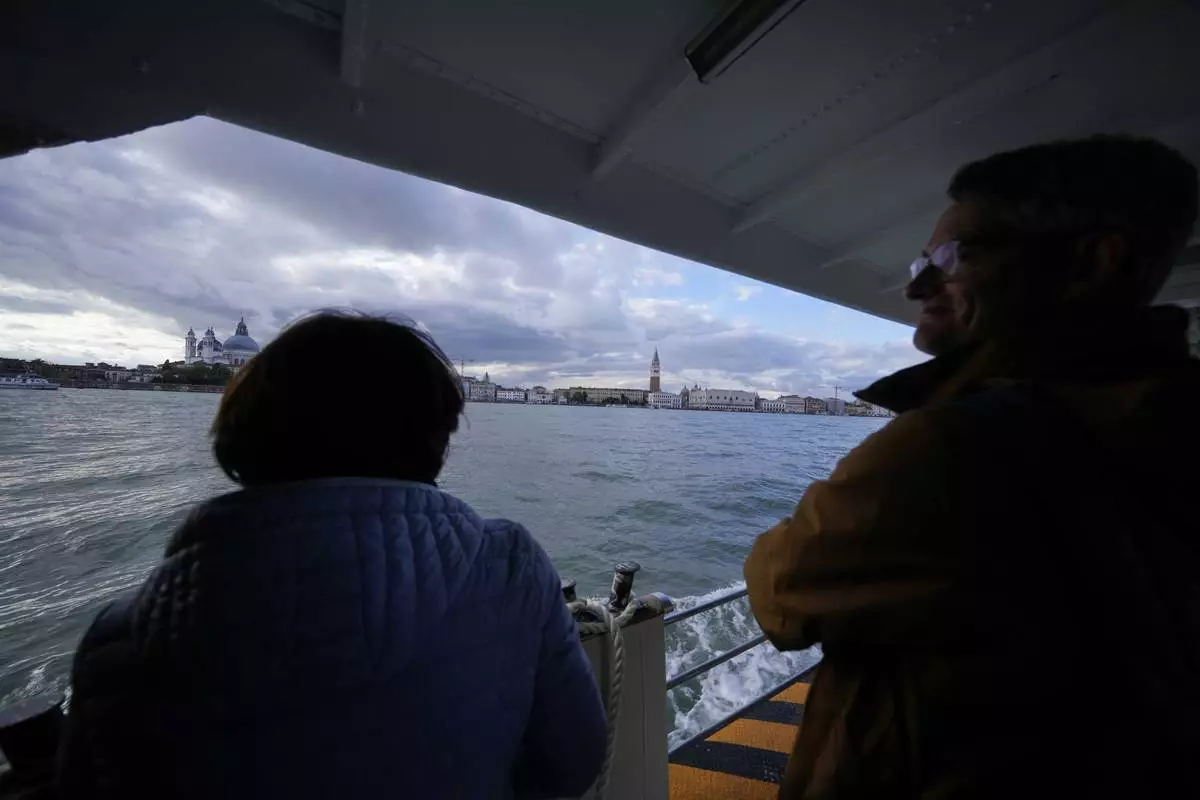
Tourists ride on a ferry boat in Venice, Italy, Wednesday, April 24, 2024. The lagoon city of Venice begins a pilot program Thursday, April 25, 2024 to charge daytrippers a 5 euro entry fee that authorities hope will discourage tourists from arriving on peak days. Officials expect some 10,000 people will pay the fee to access the city on the first day, downloading a QR code to prove their payment. (AP Photo/Luca Bruno)
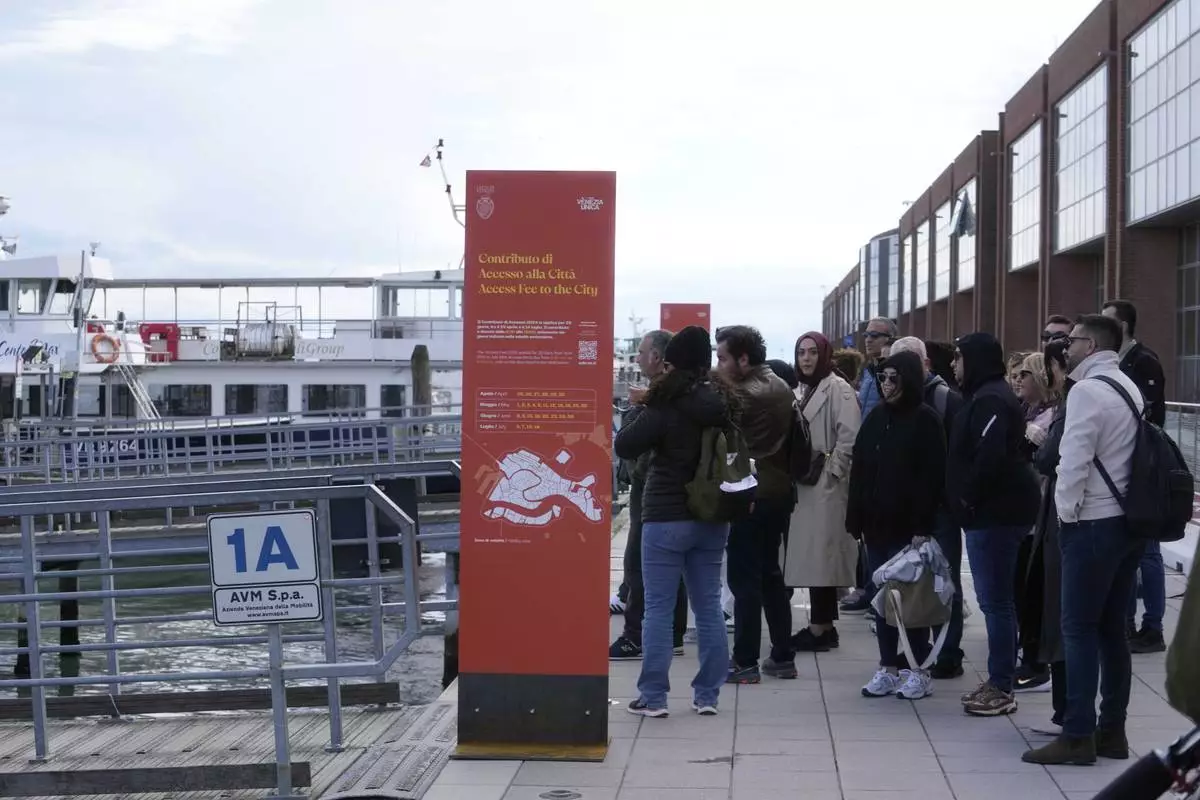
People stand in front of an information board explaining how to pay the tourist tax in Venice, Italy, Wednesday, April 24, 2024. The lagoon city of Venice begins a pilot program Thursday, April 25, 2024 to charge daytrippers a 5 euro entry fee that authorities hope will discourage tourists from arriving on peak days. Officials expect some 10,000 people will pay the fee to access the city on the first day, downloading a QR code to prove their payment. (AP Photo/Luca Bruno)
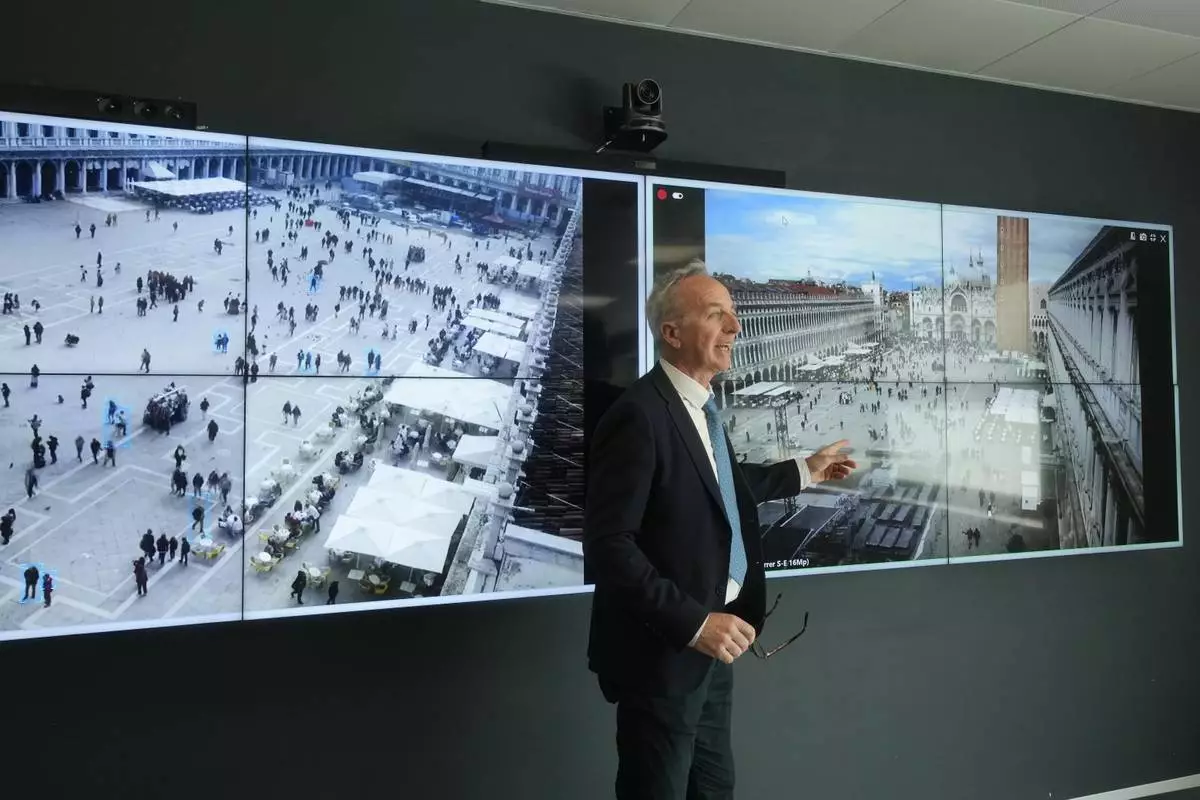
Marco Bettini, director of Venis Informatics System, gestures as he talks to reporters at the police Venice control room, in Venice, Italy, Wednesday, April 24, 2024. The lagoon city of Venice begins a pilot program Thursday, April 25, 2024 to charge daytrippers a 5 euro entry fee that authorities hope will discourage tourists from arriving on peak days. Officials expect some 10,000 people will pay the fee to access the city on the first day, downloading a QR code to prove their payment. (AP Photo/Luca Bruno)
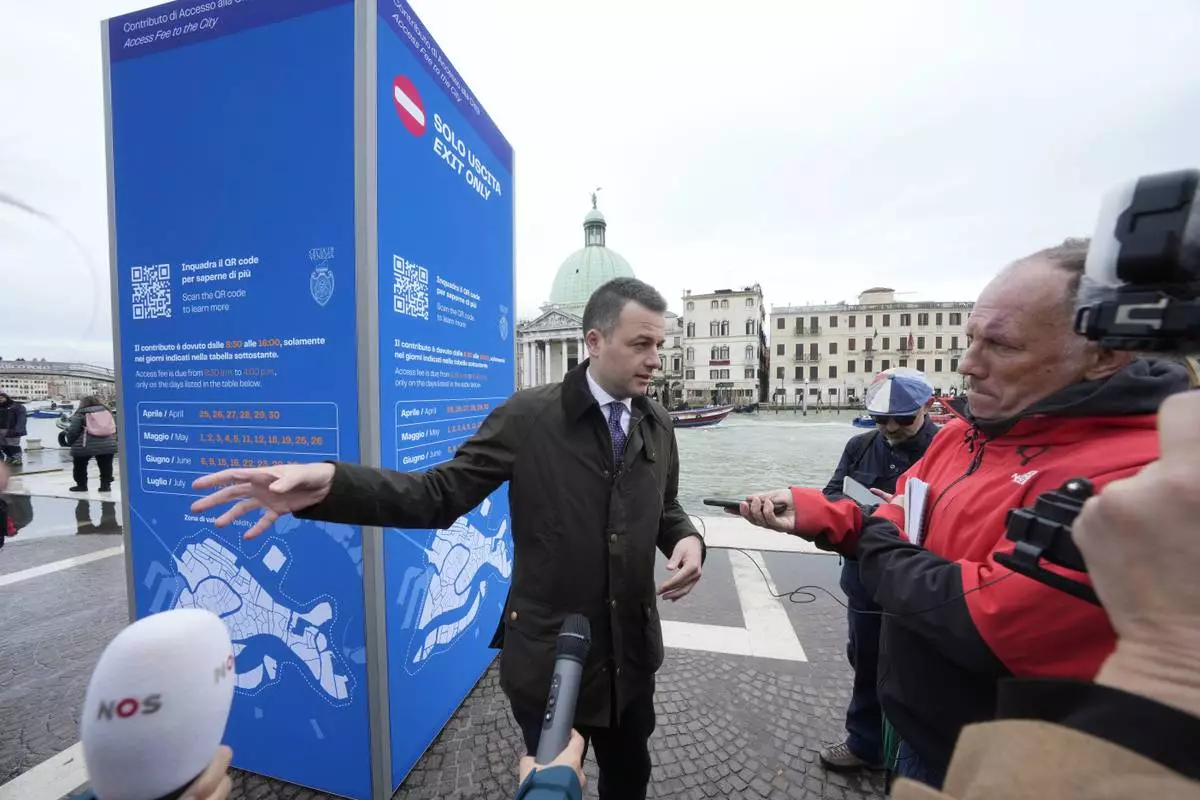
Venice councillor Simone Venturini speaks with reporters in front of a tourist tax totem in Venice, Italy, Wednesday, April 24, 2024. The lagoon city of Venice begins a pilot program Thursday, April 25, 2024 to charge daytrippers a 5 euro entry fee that authorities hope will discourage tourists from arriving on peak days. Officials expect some 10,000 people will pay the fee to access the city on the first day, downloading a QR code to prove their payment. (AP Photo/Luca Bruno)
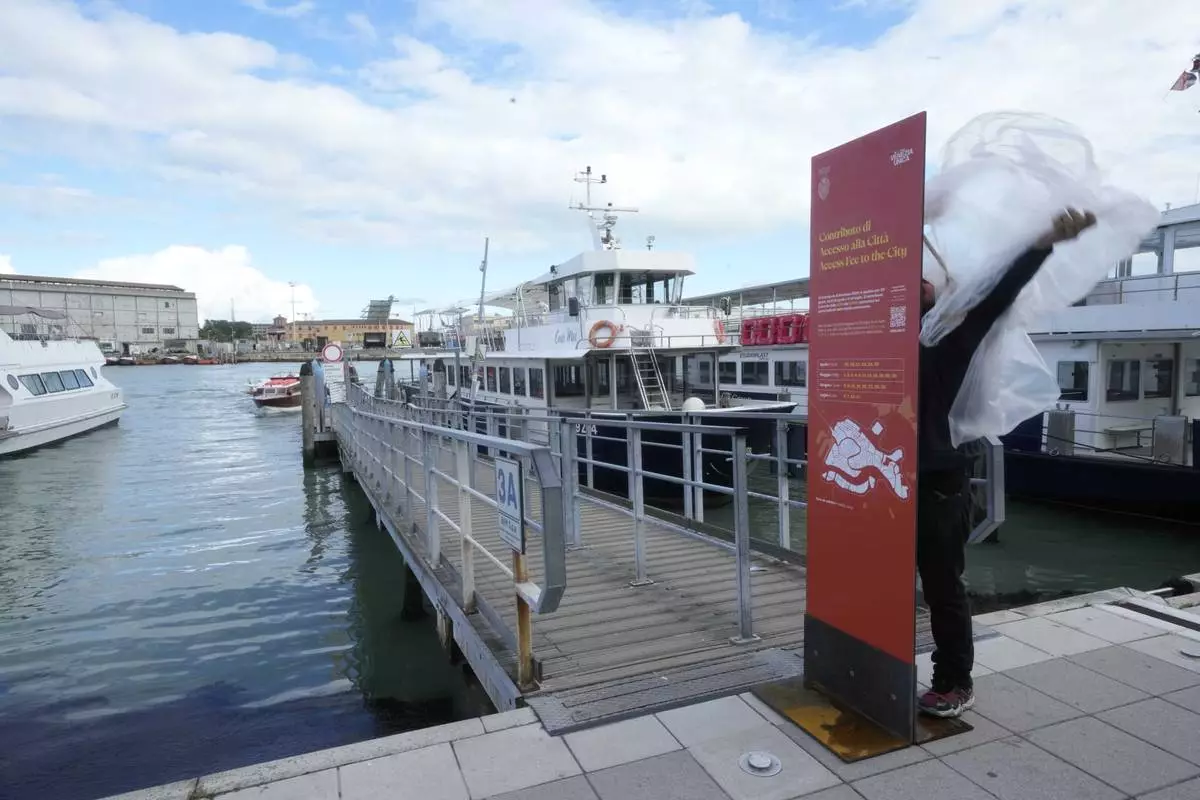
Workers prepare banner explaining how to pay the tourist tax in Venice, Italy, Wednesday, April 24, 2024. The lagoon city of Venice begins a pilot program Thursday, April 25, 2024 to charge daytrippers a 5 euro entry fee that authorities hope will discourage tourists from arriving on peak days. Officials expect some 10,000 people will pay the fee to access the city on the first day, downloading a QR code to prove their payment. (AP Photo/Luca Bruno)
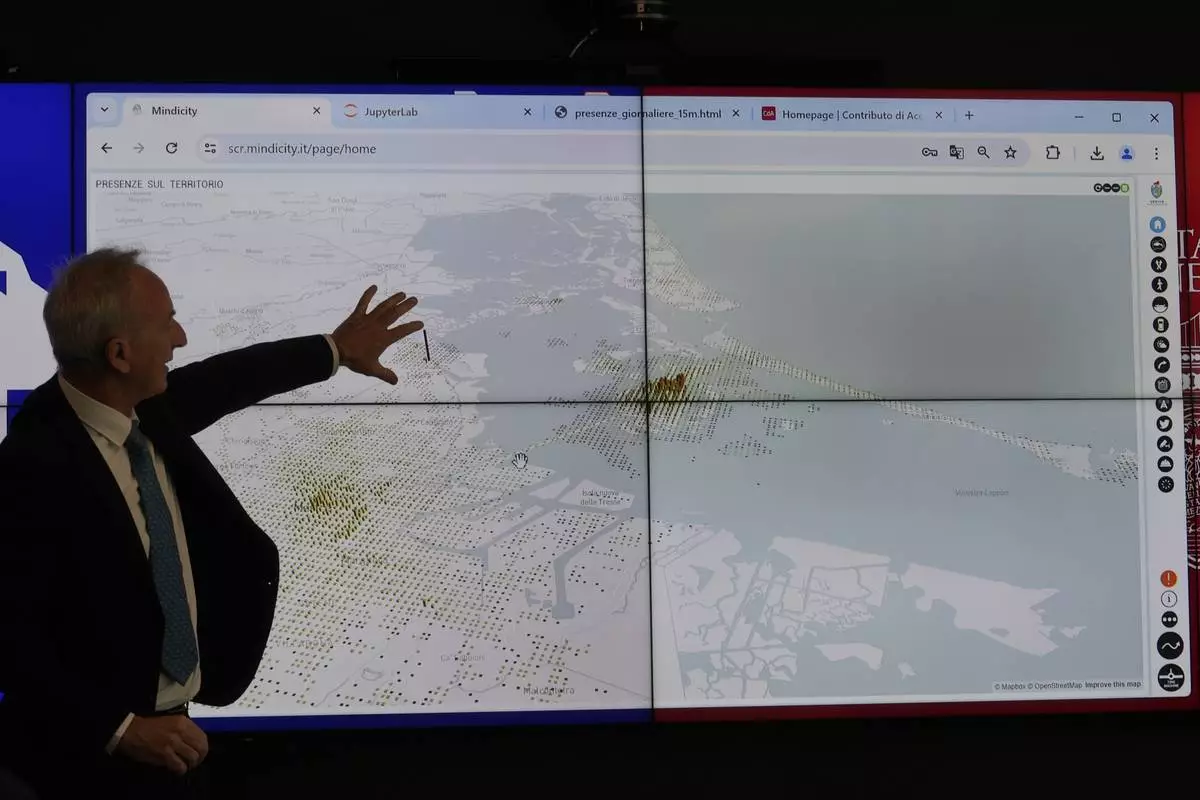
Marco Bettini, director of Venis Informatics System, gestures as he explains the Venice density to reporters at the police Venice control room in Venice, Italy, Wednesday, April 24, 2024. The lagoon city of Venice begins a pilot program Thursday, April 25, 2024 to charge daytrippers a 5 euro entry fee that authorities hope will discourage tourists from arriving on peak days. Officials expect some 10,000 people will pay the fee to access the city on the first day, downloading a QR code to prove their payment. (AP Photo/Luca Bruno)
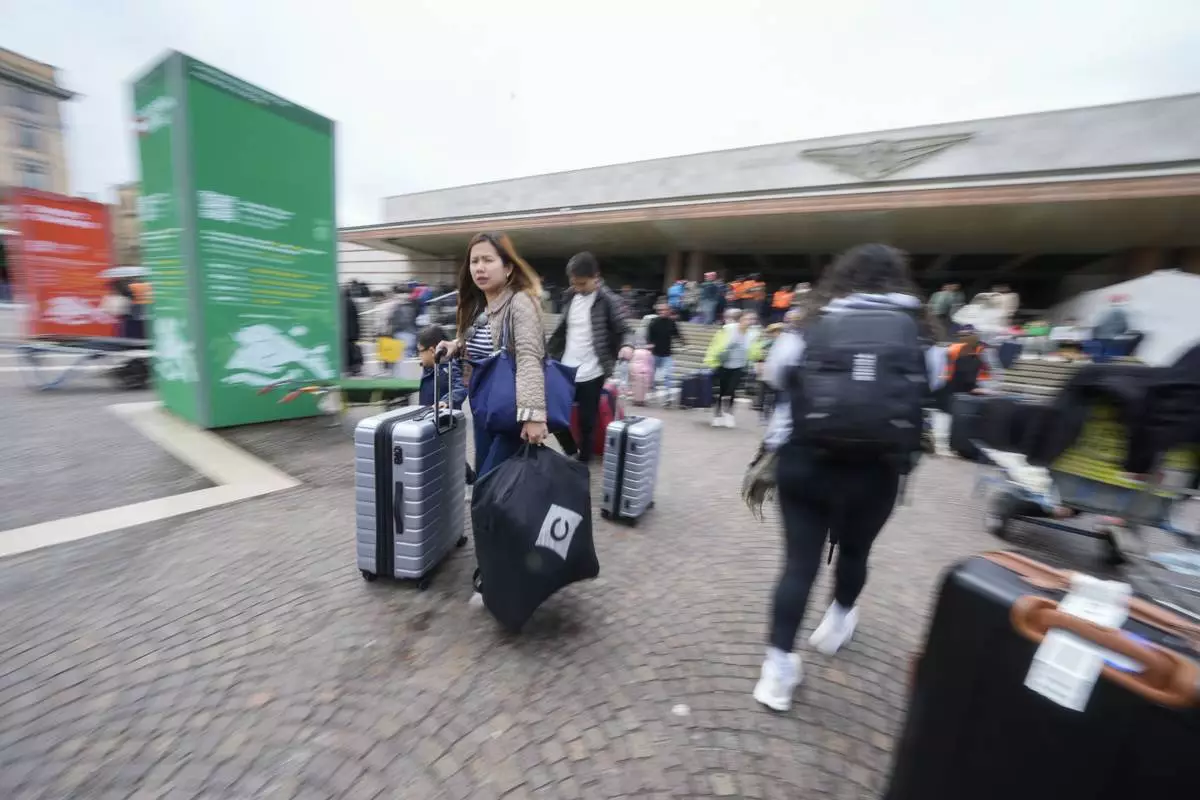
Tourists arrive at the main train station in Venice, Italy, Wednesday, April 24, 2024. The lagoon city of Venice begins a pilot program Thursday, April 25, 2024 to charge daytrippers a 5 euro entry fee that authorities hope will discourage tourists from arriving on peak days. Officials expect some 10,000 people will pay the fee to access the city on the first day, downloading a QR code to prove their payment. (AP Photo/Luca Bruno)
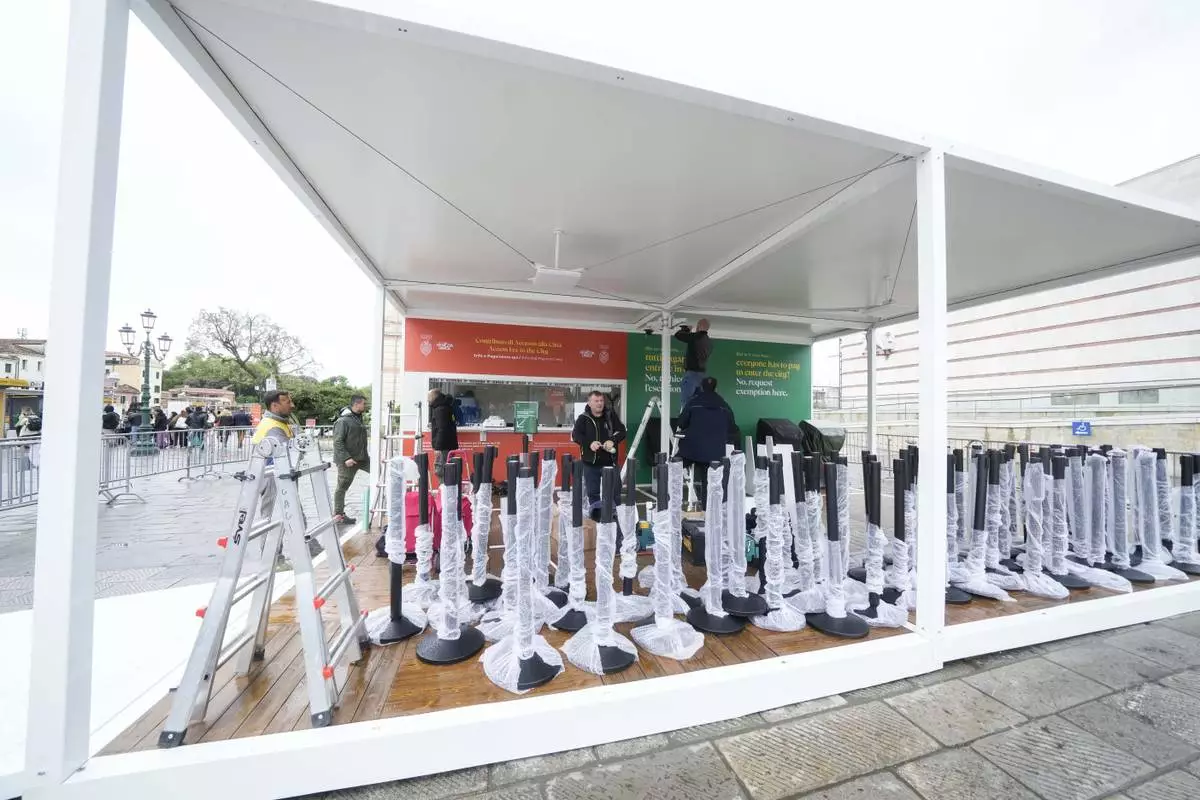
Workers prepare the tourist tax cashier desks outside the main train station in Venice, Italy, Wednesday, April 24, 2024. The lagoon city of Venice begins a pilot program Thursday, April 25, 2024 to charge daytrippers a 5 euro entry fee that authorities hope will discourage tourists from arriving on peak days. Officials expect some 10,000 people will pay the fee to access the city on the first day, downloading a QR code to prove their payment. (AP Photo/Luca Bruno)
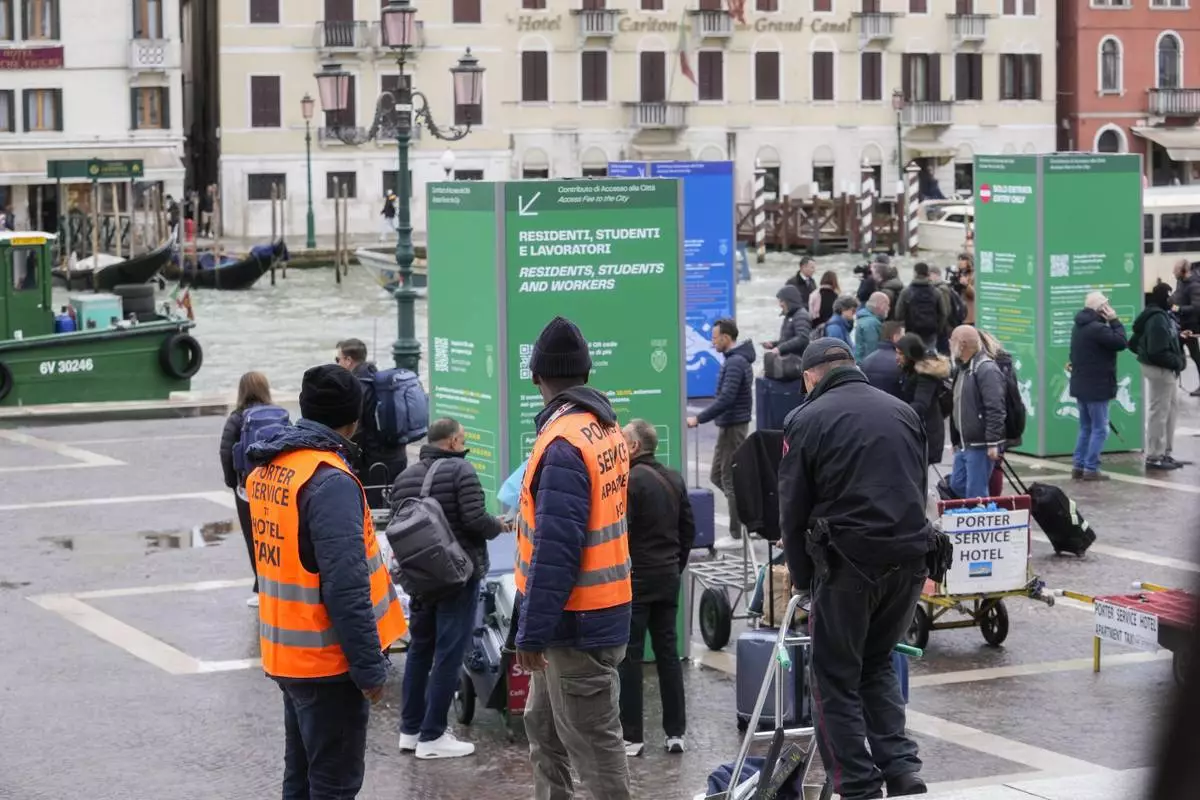
Porters wait for tourists outside the main train station in Venice, Italy, Wednesday, April 24, 2024. The lagoon city of Venice begins a pilot program Thursday, April 25, 2024 to charge daytrippers a 5 euro entry fee that authorities hope will discourage tourists from arriving on peak days. Officials expect some 10,000 people will pay the fee to access the city on the first day, downloading a QR code to prove their payment. (AP Photo/Luca Bruno)
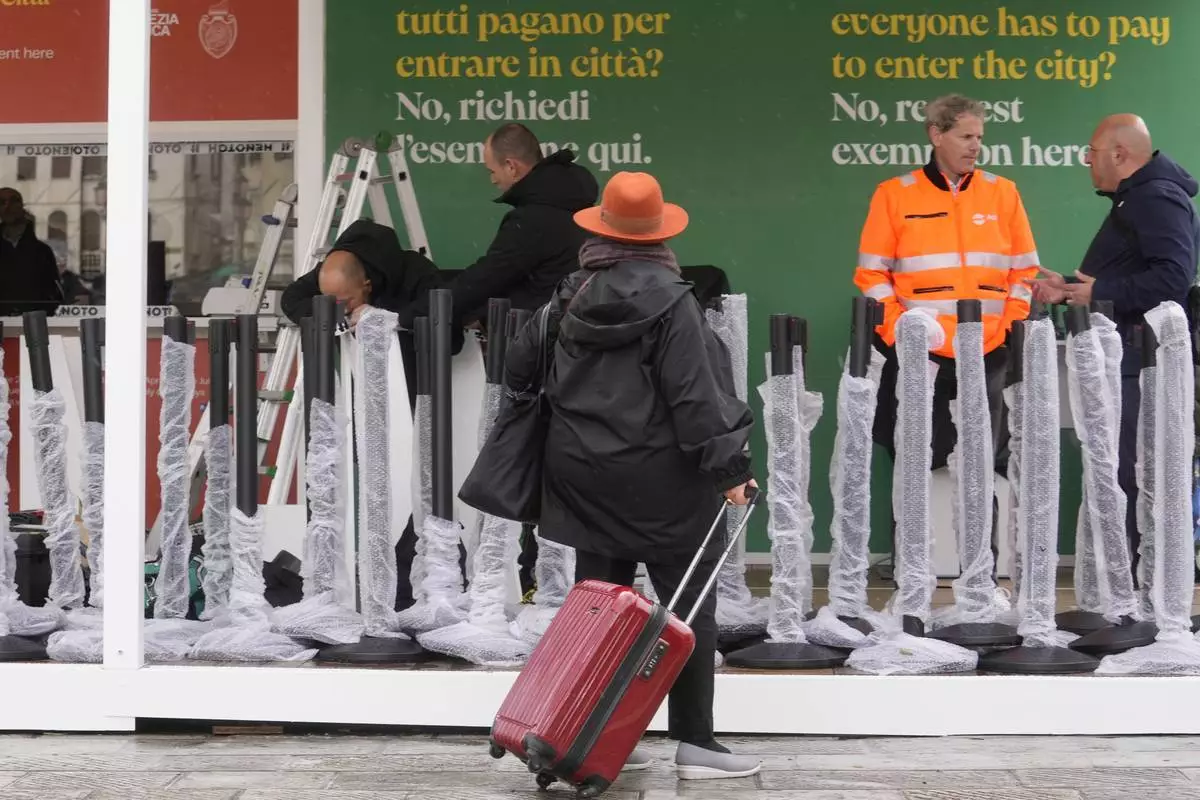
Workers prepare the tourist tax cashier desks outside the main train station in Venice, Italy, Wednesday, April 24, 2024. The lagoon city of Venice begins a pilot program Thursday, April 25, 2024 to charge daytrippers a 5 euro entry fee that authorities hope will discourage tourists from arriving on peak days. Officials expect some 10,000 people will pay the fee to access the city on the first day, downloading a QR code to prove their payment. (AP Photo/Luca Bruno)
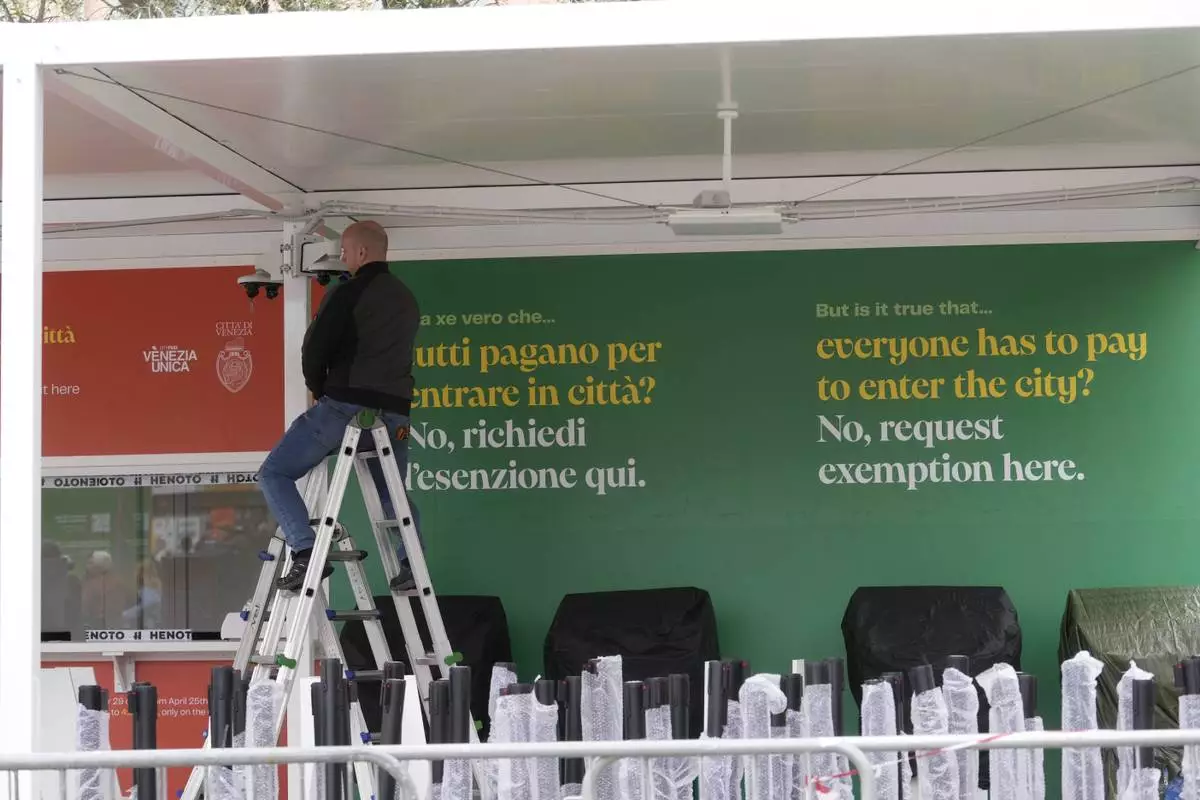
Workers prepare the tourist tax cashier desks outside the main train station in Venice, Italy, Wednesday, April 24, 2024. The lagoon city of Venice begins a pilot program Thursday, April 25, 2024 to charge daytrippers a 5 euro entry fee that authorities hope will discourage tourists from arriving on peak days. Officials expect some 10,000 people will pay the fee to access the city on the first day, downloading a QR code to prove their payment. (AP Photo/Luca Bruno)
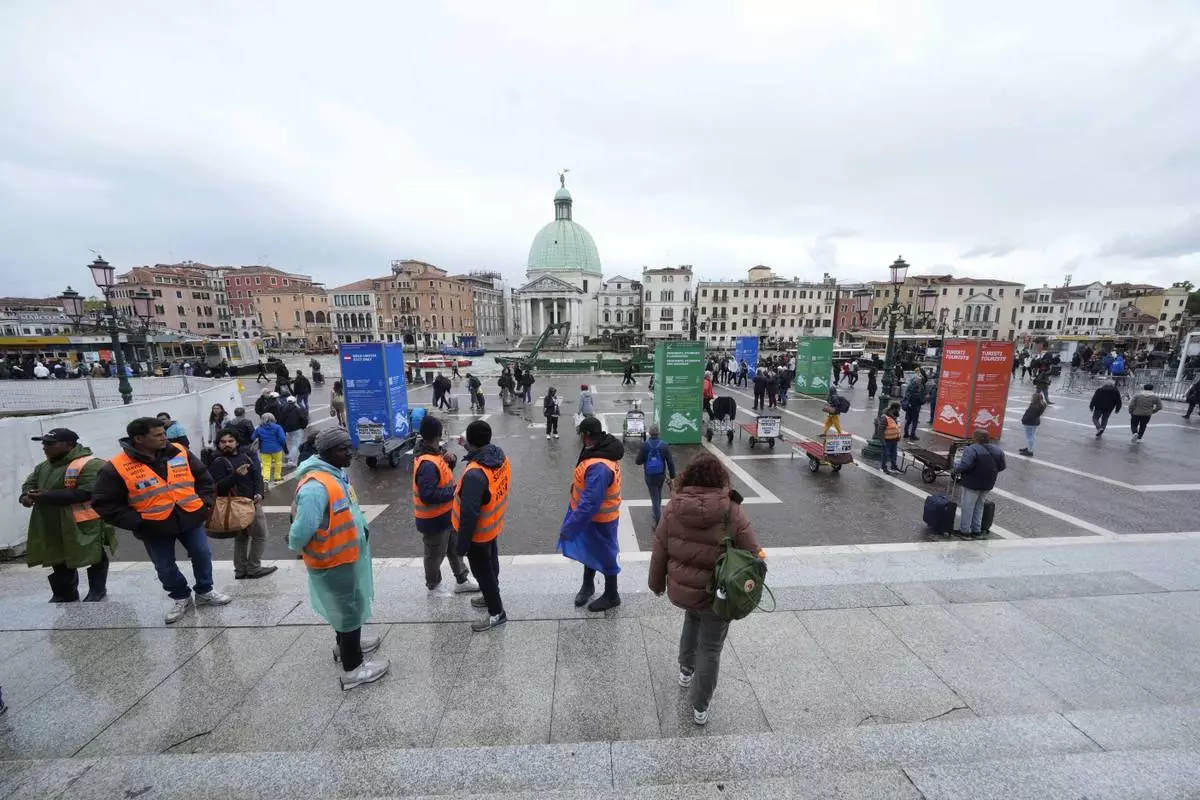
Porters wait for tourists outside the main train station in Venice, Italy, Wednesday, April 24, 2024. The lagoon city of Venice begins a pilot program Thursday, April 25, 2024 to charge daytrippers a 5 euro entry fee that authorities hope will discourage tourists from arriving on peak days. Officials expect some 10,000 people will pay the fee to access the city on the first day, downloading a QR code to prove their payment. (AP Photo/Luca Bruno)
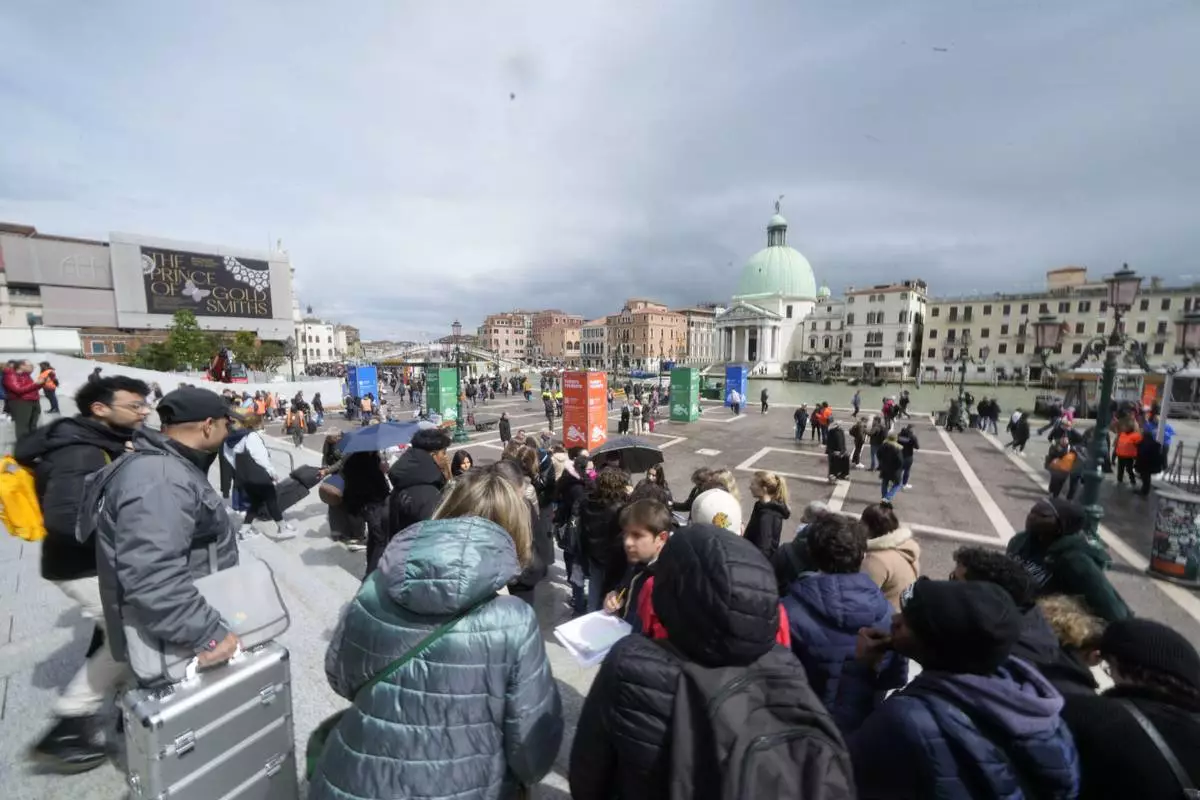
Tourists arrive outside the main train station in Venice, Italy, Wednesday, April 24, 2024. The lagoon city of Venice begins a pilot program Thursday, April 25, 2024 to charge daytrippers a 5 euro entry fee that authorities hope will discourage tourists from arriving on peak days. Officials expect some 10,000 people will pay the fee to access the city on the first day, downloading a QR code to prove their payment. (AP Photo/Luca Bruno)
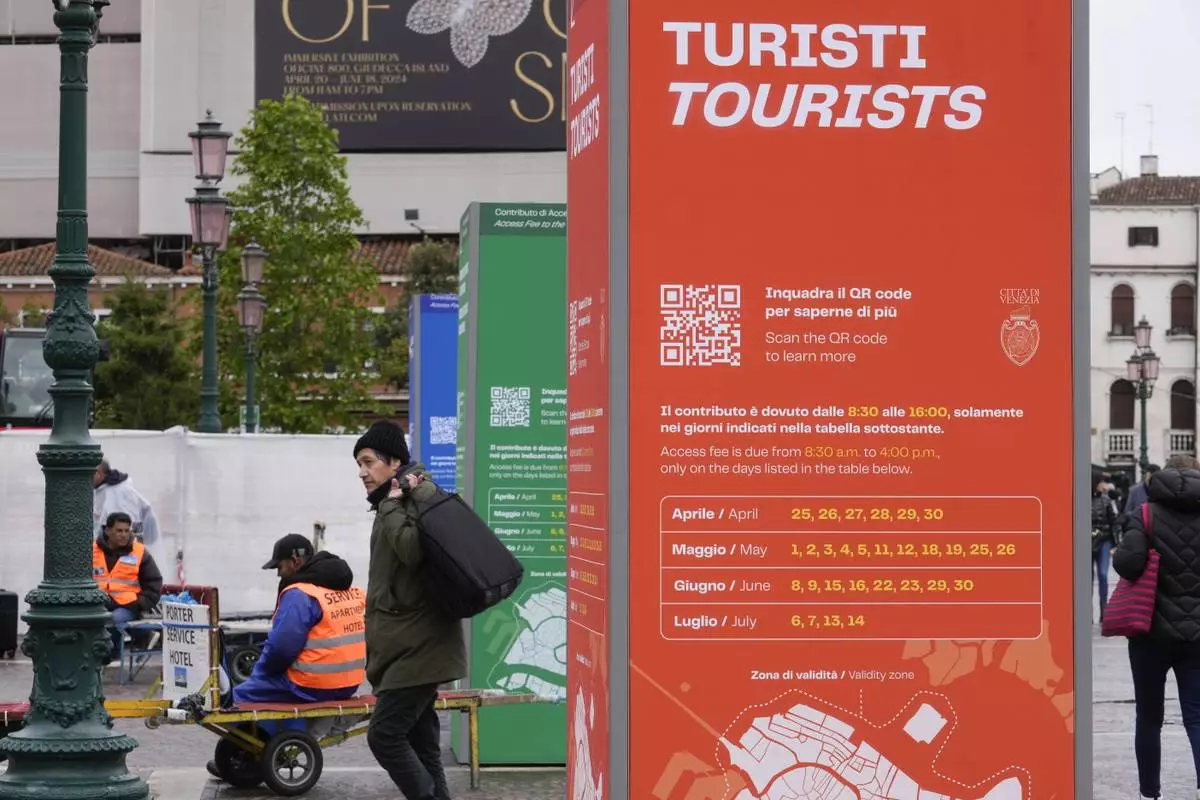
Tourist information boards are seen outside the main train station in Venice, Italy, Wednesday, April 24, 2024. The lagoon city of Venice begins a pilot program Thursday, April 25, 2024 to charge daytrippers a 5 euro entry fee that authorities hope will discourage tourists from arriving on peak days. Officials expect some 10,000 people will pay the fee to access the city on the first day, downloading a QR code to prove their payment. (AP Photo/Luca Bruno)
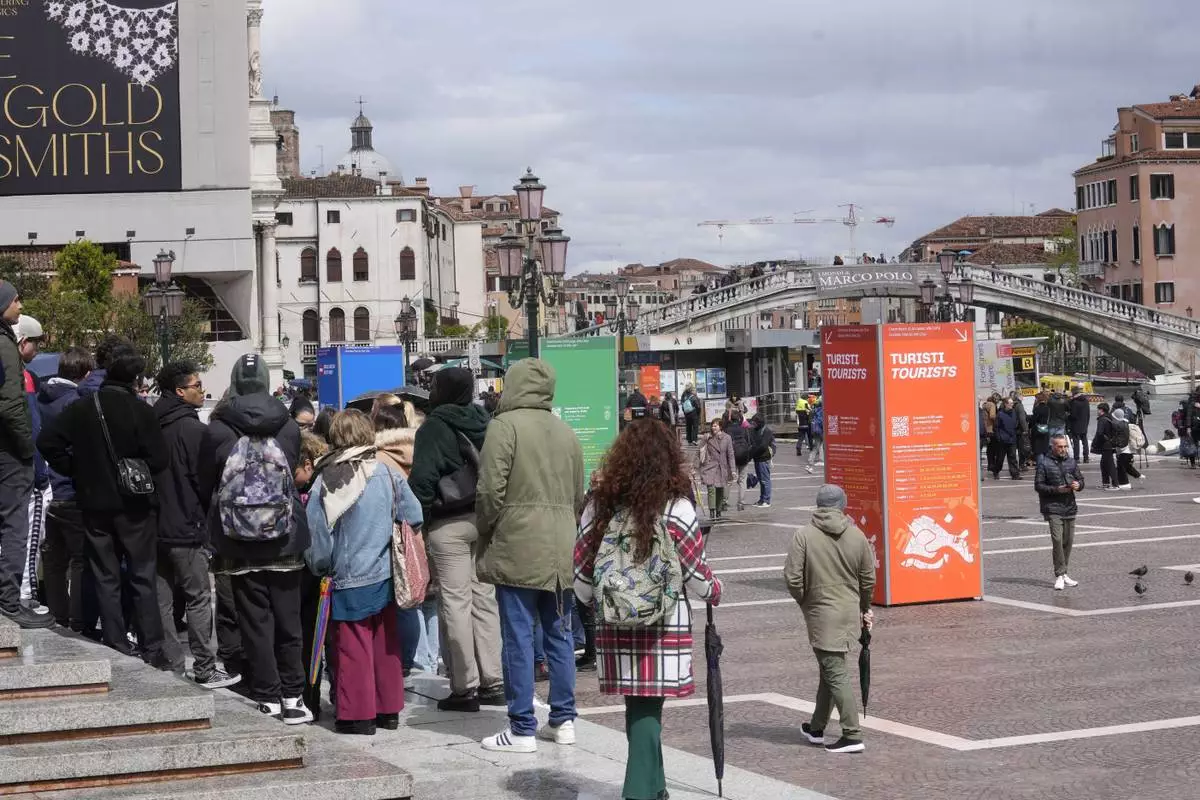
Tourists arrive outside the main train station in Venice, Italy, Wednesday, April 24, 2024. The lagoon city of Venice begins a pilot program Thursday, April 25, 2024 to charge daytrippers a 5 euro entry fee that authorities hope will discourage tourists from arriving on peak days. Officials expect some 10,000 people will pay the fee to access the city on the first day, downloading a QR code to prove their payment. (AP Photo/Luca Bruno)



























